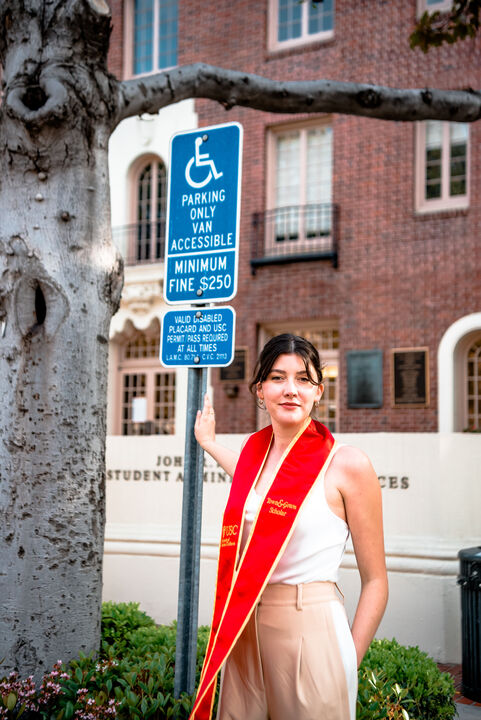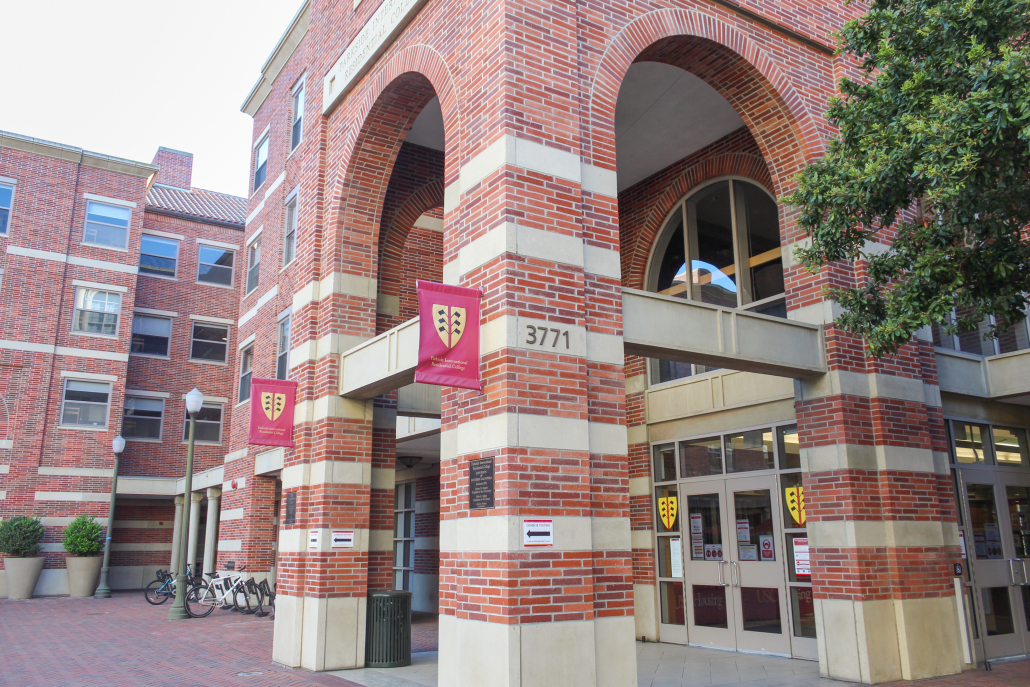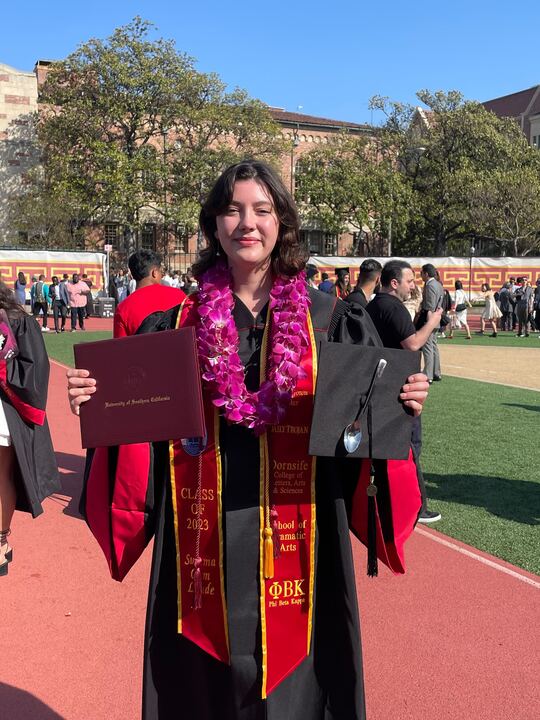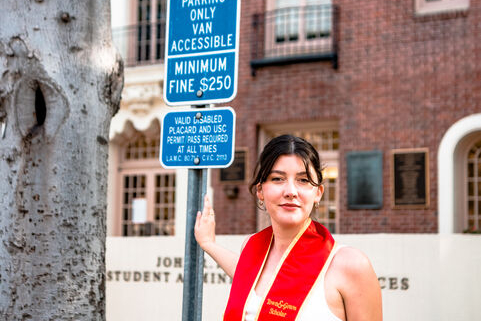Chronically Catherine: What it’s really like to be a student with a disability at USC

USC after recently graduating, from difficult experiences to tiny victories. (Jay Gonzalez)
What is it really like to be a student with a disability at USC?
It’s a question I had before my first day of classes and the one that prompted me to start this column. In this final installment of Chronically Catherine at the Daily Trojan, my parting gift to you is an answer.
Let me make one thing clear — this isn’t some Regina George-style takedown, but the reality is that students with disabilities at USC need better.
I became chronically ill and disabled at age 20. Forced to transfer universities, I visited USC where admissions officers ensured me a seamless transition into the life of a Trojan with a wide variety of resources available to students with disabilities — from guaranteed housing to academic accommodations through the Office of Student Accessibility Services. My acceptance a year later distracted me from my third hospitalization in two months. I had hope for the first time in years.
Sadly, I quickly learned that Admissions’ promises were fragmented from reality.
First, I faced housing hurdles. It felt like pulling teeth trying to get Housing to acknowledge my need for a room close to Student Health which would allow me to maintain my health; a “reasonable accommodation” supported by the Americans with Disability Act at schools that receive federal funding.
It wasn’t until my mom stepped in to help me escalate the issue to senior leadership — and President Carol Folt — that I finally got an on-campus apartment a week before the start of the semester.
I learned recently from my friend Rachel Miller, an incredibly talented scientist, sophomore, and wheelchair-using student, that she experienced similar difficulties with finding accessible housing.
“My freshman year was a bit challenging as all the dorms with automatic doors were full, so they placed me in an ADA- compliant dorm in IRC,” she said. “However, because it was an extremely heavy safety door and not automatic, I could not open it. USC’s solution was for me to text my roommates anytime I would need to open the door. It was quite frustrating because I felt like it shouldn’t be someone else’s responsibility to make sure I can get into my own room.”
After this, I was wary of how USC supported disabled students. I learned from friends and readers that OSAS case managers were either largely unhelpful or literal godsends — to my luck, I experienced the latter.
Outside of my OSAS case manager, the people who were most helpful to me were junior and mid-level staff. Unsung angels championed my educational journey in the most unexpected places.
Students at the Cardinal Gardens package center would hand-deliver boxes of medicine to my apartment when I was too weak to get them myself. Kind professors subtly dimmed the lights because they knew I had a migraine, which helped me through my toughest days. It’s been small acts of kindness like these that make me feel like a Trojan.
For every tiny victory — represented by a supportive professor or TA — I had twice the number of horrible experiences. Sometimes I couldn’t reach my academic advisors for weeks despite my priority registration accommodation, something they controlled. Professors openly questioned my disability because it’s invisible, and department heads never responded to my emails asking for help navigating academic issues while I was in the hospital. I felt abandoned.

In several posts on the USC Reddit, students with disabilities also expressed their deep anxiety over their disability being questioned by professors.
“I’ve had some professors act like it’s optional for them to accept my accommodations, even though they’re required to,” one user posted. “I’ve also had professors see my accommodations and question whether I’ll ever come to class or if I’ll just constantly miss for medical reasons, which I think is a rude assumption to make.”
But the problem isn’t USC Housing, OSAS or even academic advising; they’re symptoms of poor investment in the disabled student experience — and the silence from the top is deafening. Students with disabilities are led to believe by admissions that housing is a shoo-in when, in reality, Housing struggles to provide rooms to disabled students every year, like myself and Rachel experienced.
While Rachel was eventually placed in a dorm with an automatic door, this delay in accessibility impacted her, and OSAS was her only advocate.
“The USC Office of Student Accessibility Services has the support of the University for the resources needed to serve our students,” wrote Debbie Jih, senior director of OSAS, in a statement to the Daily Trojan. “Our team of 25 is one of the largest teams among our peer institutions in the country and serves about 4,700 students.”
That means the OSAS case-manager-to-student ratio is roughly 1:188. Worse so, the academic advisor-to-student ratio in Dornsife lies around 1:400.
It’s no wonder students registered with OSAS feel adrift, and my priority registration accommodation fell flat — both departments seem underwater and understaffed. Neither able-bodied nor disabled students can thrive in the current housing and academic advising systems, with disabled students harmed at a greater severity.
Barriers to an accessible education can happen at any university. That said, it is disheartening to see USC spend lavishly on a football coach, new campus in Washington D.C. and a new multi-million dollar field — part of which is made possible through Folt’s presidential fund — when a fraction of that money could go to improving systems that are meant to support students with disabilities but currently hinder them.

The Office of Student Accessibility Services and USC housing promised more than they delivered in Catherine Ames’ experience as a disabled student. (Catherine Ames)
What’s even more disheartening is that, comparably, USC ranks highly in universities recommended for students with disabilities, yet there is still work to be done.
I found support in unexpected places, yet I still wonder if I’ll ever feel that same support from USC at large. I wonder when my university will realize what a permanent and powerful difference it can make in all students’ lives if it intentionally invests in making a USC education truly accessible for disabled students.
Improving systems supporting disabled students helps all students. So what if USC led the charge? What if USC could be the place students with disabilities want to come to because of how valued they are?
To USC, I say thank you for accepting me and for pushing me to learn self-advocacy the hard way. To the future students and alumni of USC, I say be unafraid to call out injustice and ask for something better. If you’re a prospective student with a disability or a current student, know you deserve to be here — take up space. Even places like a well-endowed USC need changemakers to lift the veil on the disabled student experience and advocate for a better, more inclusive future.
At times, these systematic flaws made me want to give up, drop out, and even made me hate my body — simply because advocating for myself as a disabled student was utterly exhausting. However, as Carrie Bradshaw so eloquently puts it, “Maybe the best any of us can do is not to quit, play the hand we’ve been given and accessorize the outfit we got.”
And just like that, my time at USC is up.
With love and fabulosity,
Chronically Catherine
Writer’s note: Chronically Catherine will continue on outside of the Daily Trojan. You can still reach out to Chronically Catherine if you’re also a student with a disability working to coexist with daily adversity without losing sight of your fabulosity — @itschronicallycatherine on Instagram, or [email protected].
Catherine Ames is a newly graduated senior writing about life as a young person coexisting with chronic illness in her column, “Chronically Catherine.”

